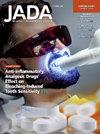α -半乳糖综合征:使用牙科产品后过敏反应的可能性:与口腔保健相关的文献综述和病例报告。
IF 3.5
2区 医学
Q1 DENTISTRY, ORAL SURGERY & MEDICINE
引用次数: 0
摘要
背景:α -半乳糖综合征(AGS)与一种潜在的严重迟发性免疫球蛋白超敏反应有关,这种反应主要是由孤星蜱(Amblyomma americanum)叮咬产生的唾液低聚糖(半乳糖-1,3-半乳糖)传播产生的。致敏人群对多种食品、药品以及医疗和牙科产品发生交叉反应的风险增加,这些反应可能导致一系列病理生理反应,从胃肠道和皮肤紊乱到过敏反应。作者总结了相关文献,并提出了一个病例报告描述α -半乳糖(AG)反应与口腔保健。综述的研究类型:作者提供了从PubMed和谷歌Scholar电子数据库获得的AGS临床研究、综述文章、病例报告和病例系列的概述。此外,各种医疗和牙科药品和保健产品的抗原表位的存在进行了审查。结果:与类AG事件相关的因素包括食用非灵长类动物的红肉和乳制品,摄入含有动物成分和辅料的药物,以及使用含有AG表位的医疗和牙科产品。ags相关牙齿事件最常见的促进因素是动物止血剂的使用。实际意义:口腔卫生保健提供者应该了解AGS的显著特征,并对受影响患者的诊断、触发事件、相关不良事件和使用的治疗措施进行彻底的审查。为了更深入地了解受影响患者的疾病,建议咨询他们的主治过敏症专科医生或免疫学家。为了减少过敏反应的发生,主治医生必须严格避免使用表达AG表位的药物和医疗或牙科产品。本文章由计算机程序翻译,如有差异,请以英文原文为准。
Alpha-gal syndrome: potential for a hypersensitivity reaction after the use of dental products
Background
Alpha-gal syndrome (AGS) is associated with a potentially severe delayed immunoglobulin E–based hypersensitivity reaction produced via transmission of a salivary oligosaccharide (galactose-⍺-1,3-galactose) predominately from the bite of the lone star tick (Amblyomma americanum). Sensitized people are at an increased risk of experiencing cross-reactivity reactions to numerous foods, pharmaceuticals, and medical and dental products that could result in a spectrum of pathophysiological responses, ranging from gastrointestinal and cutaneous disturbances to anaphylaxis. The authors have summarized the relevant literature and presented a case report describing an alpha-gal (AG) reaction associated with oral health care.
Types of Studies Reviewed
The authors provided an overview of clinical studies, review articles, case reports, and case series of AGS obtained from PubMed and Google Scholar electronic databases. In addition, various medical and dental pharmaceuticals and health care products were reviewed for the presence of AG epitopes.
Results
Factors implicated in an AGS-like event included consuming nonprimate red meat and dairy products, intake of pharmaceuticals with animal-based ingredients and excipients, and use of medical and dental products containing AG epitopes. The most common promoter of AGS-related dental events was the administration of animal-based hemostatic agents.
Practical Implications
Oral health care providers should be knowledgeable about the salient features of AGS and perform a thorough review of an affected patient’s diagnosis, triggering events, associated adverse incidents, and therapeutic measures used. To gain greater insight into an affected patient’s disorder, consultation with their attending allergist or immunologist is advised. To reduce the onset of a hypersensitivity reaction, attending clinicians must maintain strict avoidance of the use of pharmaceuticals and medical or dental products that express AG epitopes.
求助全文
通过发布文献求助,成功后即可免费获取论文全文。
去求助
来源期刊

Journal of the American Dental Association
医学-牙科与口腔外科
CiteScore
5.30
自引率
10.30%
发文量
221
审稿时长
34 days
期刊介绍:
There is not a single source or solution to help dentists in their quest for lifelong learning, improving dental practice, and dental well-being. JADA+, along with The Journal of the American Dental Association, is striving to do just that, bringing together practical content covering dentistry topics and procedures to help dentists—both general dentists and specialists—provide better patient care and improve oral health and well-being. This is a work in progress; as we add more content, covering more topics of interest, it will continue to expand, becoming an ever-more essential source of oral health knowledge.
 求助内容:
求助内容: 应助结果提醒方式:
应助结果提醒方式:


